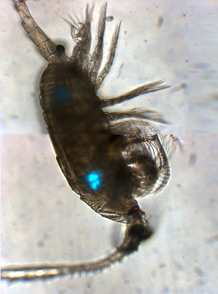
Many marine animals have been shown to ingest microbeads, mistaking them for food.
University of Exeter expert welcomes microbead ban
A University of Exeter expert has welcomed the announcement by the Government today that plastic microbeads in cosmetics will be banned.
Tamara Galloway, Professor of Ecotoxicology at the University of Exeter, is one of the UK’s leading experts in marine pollution and her team studies the health effects of microplastics pollution.
Environment Secretary Andrea Leadsom has announced plans to ban the sale and manufacture of cosmetics and personal care products containing microbeads, which are tiny pieces of plastic.
Professor Galloway said: “This is a fantastic example of the Government responding swiftly to the overwhelming scientific evidence that microbeads are bad for the marine environment.
“We find tiny pieces of plastic in every sample of seawater we study from around the world. Microbeads in cosmetics are one example. They don’t biodegrade and instead accumulate in the oceans where they are mistaken for food by many marine animals.
“A ban on their use in cosmetics is a very welcome step towards tackling marine pollution. It has also made all of us think more about the massive amounts of plastic litter we discard into the environment every day.
“Microbeads don’t biodegrade and instead accumulate in the oceans. Our research has shown that many marine animals ingest microbeads, mistaking them for food. They can become lodged in the animal’s gut, and prevent them from eating nutritious food. They can also pass chemicals into the animal’s tissues. When these animals are eaten, the microplastics and the chemicals they contain can be passed through the food chain too
“It has been estimated that an average plate of oysters could contain up to 50 plastic particles. We don’t yet have any evidence for the harm that this might cause, but most people would probably prefer not to be eating plastic in their food
“Pollution from microbeads is a truly global problem. Tides and currents can carry pollution across oceans to countries a long distance from where they were originally released. Ideally, any legislation to control them should be on an international level.
“The proposed UK ban is a very welcome step in the right direction. The best way to reduce marine pollution and protect marine animals from harm is to stop throwing things into the ocean in the first place.”
Microplastic pollution comes from the fragmentation of larger pieces of plastic waste, small synthetic fibres from clothing and the microbeads used in cosmetics and other products. It is estimated that as much as 86 tonnes of microplastics is released into the environment every year in the UK from facial exfoliants alone.
Date: 3 September 2016
